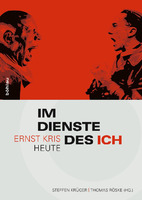Im Dienste des Ich
Ernst Kris heute
| dc.contributor.author | Krüger, Steffen | |
| dc.contributor.author | Röske, Thomas | |
| dc.date.accessioned | 2013-12-31 23:55:55 | |
| dc.date.accessioned | 2020-02-04 11:44:24 | |
| dc.date.accessioned | 2020-04-01T14:57:50Z | |
| dc.date.available | 2020-04-01T14:57:50Z | |
| dc.date.issued | 2013 | |
| dc.identifier | 453614 | |
| dc.identifier | OCN: 960759529 | en_US |
| dc.identifier.uri | http://library.oapen.org/handle/20.500.12657/33842 | |
| dc.description.abstract | This publication, which includes contributions from German, French and American academics, pays tribute to the multi faceted researcher Ernst Kris (1900 Vienna -1957 New York) from the perspective of different disciplines. In fact one needs three job descriptions to chart his output: art historian, psychoanalyst and communication scientist. At 22, Kris had concluded his art history studies at Vienna University with a doctoral thesis on the technique of casting from life in the late Renaissance, and had worked as a curator at the Kunsthistorisches Museum. By the middle of the 1920s he had already met Sigmund Freud and started an analysis – which made him slowly turn away from classical art history. In this period he developed his most interesting and fruitful texts, which founded his reputation as an art psychologist: his studies on the early classicist sculptor Franz Xaver Messerschmidt (1932/33), the text “On the psychology of caricature” (1934) and the small book he co-authored with Otto Kurz: “The Legend of the Artist” (1934). In 1938, immediately after the “Anschluss”, Kris followed Freud into exile in London, and in 1940 he moved with his family to New York. Here he initially devoted himself primarily to questions of communication science, setting up working groups to analyse the propaganda of the Axis alliance with astonishing speed. Later he taught at the New York Psychoanalytic Society and Institute, concentrating on child psychology. He set up research units at the Yale Child Study Center and from 1945 he edited the newly founded journal “The Psychoanalytic Study of the Child”. He died in New York, highly respected as an important advocate of Ego-Psychology. Thus Kris developed, partly through choice and partly by force of circumstance, a multi-disciplinary approach which is more in demand than ever today: due to the broadening of art history into a science of images, the questions that a psychologically aware communication science is confronted with today, and the recent understanding of psychoanalysis as a form of cultural investigation. Bearing this view of Kris in mind, the contributions to this publication review his writing in a newly critical way, place it in its historical context and highlight what it predicts. The publication opens up Kris’ work, which is still, unjustly, only known through some key terms in the disciplines he covers. | |
| dc.language | German | |
| dc.subject.classification | thema EDItEUR::N History and Archaeology::NH History | en_US |
| dc.subject.classification | thema EDItEUR::J Society and Social Sciences::JM Psychology | en_US |
| dc.subject.other | Psychoanalysis | |
| dc.subject.other | Psychiatry | |
| dc.subject.other | Art History | |
| dc.subject.other | Communication Science | |
| dc.subject.other | Ernst Kris | |
| dc.subject.other | Karikatur | |
| dc.subject.other | Propaganda | |
| dc.title | Im Dienste des Ich | |
| dc.title.alternative | Ernst Kris heute | |
| dc.type | book | |
| oapen.abstract.otherlanguage | Der Band mit Aufsätzen von deutschen, französischen und amerikanischen Wissenschaftlern würdigt den facettenreichen Forscher Ernst Kris (Wien 1900–1957 New York) aus den Blickwinkeln verschiedener Disziplinen. Tatsächlich muss man, um sein Schaffen zu umreißen, drei Berufsbezeichnungen bemühen: Kunsthistoriker, Psychoanalytiker und Kommunikationsforscher. Mit 22 Jahren hatte Kris sein Kunstgeschichtsstudium an der Wiener Universität mit einer Promotionsschrift zum Naturabgussverfahren in der Spätrenaissance abgeschlossen und war als Kurator am Kunsthistorischen Museum angestellt worden. Bereits Mitte der 20er Jahre begegnete er Sigmund Freud und begann eine Lehranalyse – wodurch er sich langsam von der klassischen Kunstgeschichte abwandte. Dabei entstanden seine interessantesten und fruchtbarsten Texte, die seinen Ruf als Kunstpsychologe begründeten, die Studien zum frühklassizistischen Bildhauer Franz Xaver Messerschmidt (1932/33), der Aufsatz „Zur Psychologie der Karikatur“ (1934) und die mit Otto Kurz verfasste Schrift „Die Legende vom Künstler“ (1934). 1938, gleich nach dem „Anschluss“, folgte Kris Freud ins Exil nach London, 1940 ging er mit seiner Familie nach New York City. Hier widmete er sich zunächst vor allem kommunikationswissenschaftlichen Fragestellungen, indem er mit erstaunlichem Tempo Abteilungen zur Analyse der Achsenpropaganda aufbaute. In der Folge lehrte er am New York Psychoanalytic Society and Institute und konzentrierte seine Energie auf die Psychologie des Kindes. Er richtete Forschungsgruppen am Yale Child Study Center ein und gab ab 1945 die neu gegründete Zeitschrift „The Psychoanalytic Study of the Child“ heraus. Hochgeachtet als wichtiger Vertreter der Ich-Psychologie starb er in New York. Kris entwickelte somit, halb freiwillig, halb erzwungen, eine Multidisziplinarität, die heute gefragter ist denn je – aufgrund der Ausweitung der Kunstgeschichte zu einer Bildwissenschaft als ästhetischer Leitdisziplin; aufgrund der Anforderungen, die heute an eine psychologisch informierte Kommunikationswissenschaft gestellt werden; sowie aufgrund des aktuellen Verständnisses der Psychoanalyse als Kulturanalyse. Die Beiträge des vorliegenden Bandes tragen dieser Sicht auf Kris Rechnung, indem sie seine Texte einer neuen kritischen Sichtung unterziehen, sie in ihrer Zeit würdigen und auf das Vorausschauende in ihnen hinweisen. So erschließen sie ein Werk, von dem in den betreffenden Fächern zu Unrecht meist nur einige Kernbegriffe bekannt sind. | |
| oapen.identifier.doi | 10.26530/oapen_453614 | |
| oapen.relation.isPublishedBy | af16fd4b-42a1-46ed-82e8-c5e880252510 | * |
| oapen.relation.isFundedBy | 26ae1657-c58f-4f1d-a392-585ee75c293e | |
| oapen.collection | Austrian Science Fund (FWF) | |
| oapen.imprint | Böhlau | |
| oapen.pages | 218 | |
| oapen.grant.number | D 4346 | |
| oapen.remark.public | Relevant Wikipedia pages: Ernst Kris - https://de.wikipedia.org/wiki/Ernst_Kris; Karikatur - https://de.wikipedia.org/wiki/Karikatur; Propaganda - https://de.wikipedia.org/wiki/Propaganda; Psychoanalyse - https://de.wikipedia.org/wiki/Psychoanalyse | |
| oapen.identifier.ocn | 960759529 |

